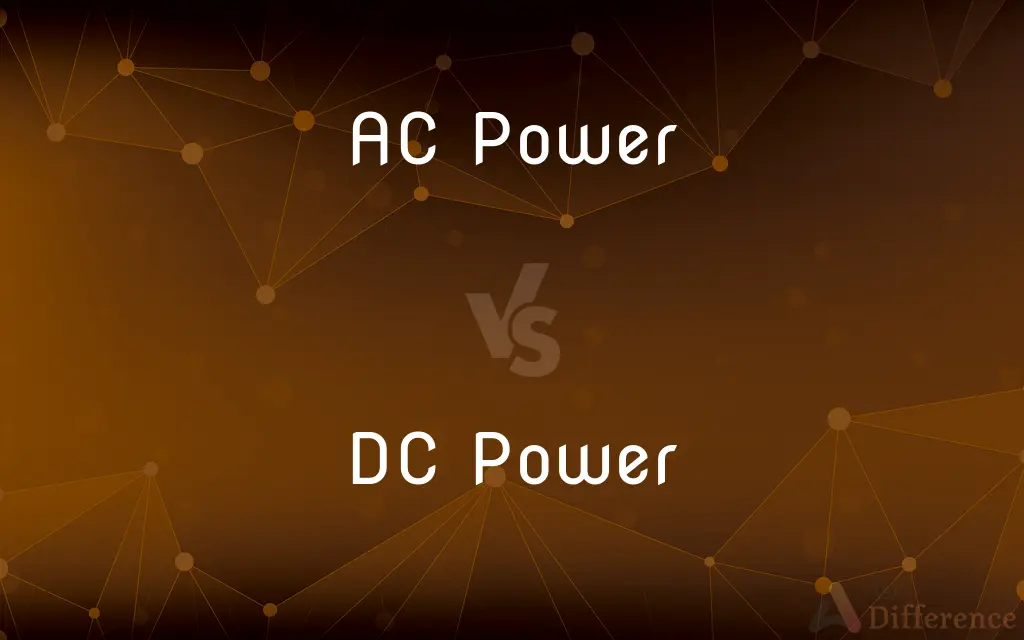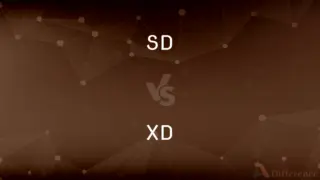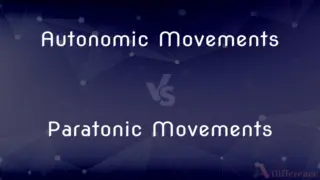AC Power vs. DC Power — What's the Difference?
By Fiza Rafique & Maham Liaqat — Published on August 5, 2024
AC Power oscillates in voltage and direction, essential for grid distribution, while DC Power maintains constant voltage and direction, ideal for electronics.

Difference Between AC Power and DC Power
Table of Contents
ADVERTISEMENT
Key Differences
AC Power, or alternating current, changes its voltage and direction periodically. This characteristic allows it to travel long distances without significant power loss, making it the preferred choice for transmitting electricity across the power grid.
DC Power, or direct current, maintains a constant voltage and direction. This stability is crucial for the operation of electronic devices and battery charging, as it ensures a steady energy supply without the need for conversion.
The conversion between AC and DC power is facilitated by devices such as rectifiers and inverters. Rectifiers convert AC to DC for use in electronics, while inverters change DC back to AC for grid distribution or when using renewable energy sources like solar panels.
AC power systems can efficiently distribute electricity over long distances due to their ability to easily transform voltage levels. This efficiency is achieved through the use of transformers, which adjust voltage levels to minimize power loss during transmission.
DC power is favored in applications where power quality and stability are critical, such as in data centers, telecommunications, and transportation systems. Its consistency is also pivotal in digital circuits and battery-powered devices, ensuring reliable operation.
ADVERTISEMENT
Comparison Chart
Current Flow
Alternates direction and varies in voltage
Constant direction and steady voltage
Transmission Efficiency
High over long distances with transformers
Lower, best suited for short distances
Conversion Equipment
Requires inverters for conversion to DC
Requires rectifiers for conversion to AC
Main Uses
Power grids, large appliances
Electronics, battery charging, vehicles
Voltage Variation
Can easily be transformed
Requires complex electronics to change
Compare with Definitions
AC Power
AC Power is electricity that alternates its direction and voltage.
Most household appliances use AC power from the electrical grid.
DC Power
DC Power supplies a constant voltage and direction.
Batteries provide DC power for portable electronics.
AC Power
Predominant in industrial and residential infrastructure.
AC power lights up cities and powers factories.
DC Power
Essential for electronic circuits and devices.
Your smartphone charges with DC power supplied by its charger.
AC Power
AC can be easily transformed into higher or lower voltages.
Transformers step down the high voltage AC for safe home use.
DC Power
Used in renewable energy systems, like solar panels.
Solar panels generate DC power that can be stored in batteries.
AC Power
It is transmitted through power lines for widespread distribution.
The national grid supplies AC power to homes and businesses.
DC Power
Integral to electric vehicle technology.
Electric cars run on DC power stored in their batteries.
AC Power
Facilitates the long-distance transmission of electricity.
AC power travels from power plants to consumers efficiently.
DC Power
Requires conversion when interfacing with AC systems.
The adapter for your laptop converts AC to DC power.
Common Curiosities
What is DC Power?
DC Power provides a constant voltage and direction, crucial for electronics and battery-powered devices.
What devices use DC power?
Electronic devices, battery chargers, and electric vehicles predominantly use DC power.
Why do electronic devices prefer DC power?
Electronic devices prefer DC power for its stability and constant voltage, which is essential for sensitive electronics.
Can AC power be converted to DC?
Yes, AC power can be converted to DC using a rectifier.
What is AC Power?
AC Power is electricity that alternates its direction and voltage, used primarily for grid distribution.
Why is AC used for power transmission?
AC is used for power transmission due to its ability to be easily transformed to higher or lower voltages, reducing power loss over long distances.
What role do transformers play in AC power distribution?
Transformers adjust AC voltage levels to minimize power loss during transmission over long distances.
Can DC power be converted to AC?
Yes, DC power can be converted to AC using an inverter.
How do solar panels produce electricity?
Solar panels produce DC electricity by converting sunlight directly into power.
Why is AC preferred for grid distribution?
AC is preferred for grid distribution because its voltage can be easily transformed, allowing for efficient long-distance transmission.
Is DC power more efficient than AC?
For long-distance transmission, AC is more efficient; however, DC is more efficient for use in electronic devices and applications requiring stable power.
What is a rectifier?
A rectifier is a device that converts AC power to DC power.
Why do electric vehicles use DC power?
Electric vehicles use DC power because batteries store electricity in DC form, and it offers efficient energy transfer for motors.
What is an inverter?
An inverter is a device that converts DC power back into AC power.
Can all electronic devices use both AC and DC power?
Not directly; many electronic devices are designed to use DC power and require adapters to convert AC power from the grid.
Share Your Discovery

Previous Comparison
SD vs. XD
Next Comparison
Autonomic Movements vs. Paratonic MovementsAuthor Spotlight
Written by
Fiza RafiqueFiza Rafique is a skilled content writer at AskDifference.com, where she meticulously refines and enhances written pieces. Drawing from her vast editorial expertise, Fiza ensures clarity, accuracy, and precision in every article. Passionate about language, she continually seeks to elevate the quality of content for readers worldwide.
Co-written by
Maham Liaqat











































